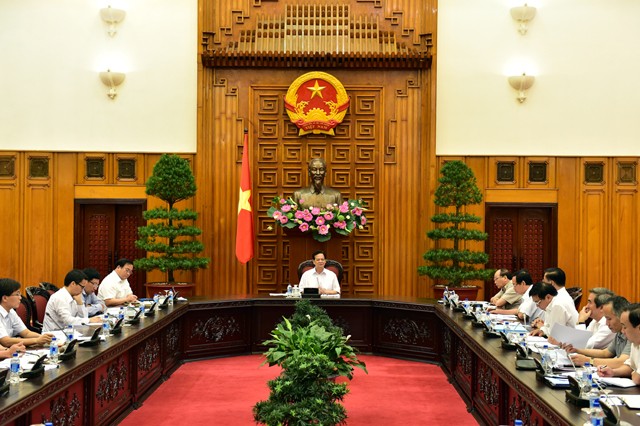(VOVworld) – Prime Minister Nguyen Tan Dung on August 25 chaired a government meeting on the impacts of the global economic crisis on Vietnam’s economy. Prior to the meeting, Vietnam had taken measures to minimize any negative impact on achieving its socio-economic targets.

The government confirms that the macro-economic is stable and under-controlled |
Negative factors include the plunge of global oil prices, unpredictable developments in the stock market, and exchange rate adjustments following China’s yuan devaluation. The growth rates of emerging economies, including China, have declined, affecting the global economy and Vietnam.
Prompt countermeasures
Vietnam has adjusted the exchange rates between the VND and major foreign currencies in response to global fluctuations. Since the beginning of the year, in response to unpredicted developments such as the lowest global oil price in history, the US interest rate rise, the EU economic crisis, and the Greek crisis, the State Bank of Vietnam (SBV) has twice raised the inter-bank exchange rate 2%. The foreign exchange market and exchange rate have been stable over the past 7 months. Nguyen Thi Hong, SBV Deputy Governor, said: “On August 11 the People’s Bank of China devalued the Chinese yuan by 1.9%, a shock which caused the decline of the EU’s major currencies. Because China and the EU countries are major trading partners of Vietnam and Vietnam has an import surplus from China, the State Bank of Vietnam decided to expand its foreign exchange rate to deal with the situation.”
The public think the government’s measures are appropriate. Associate Professor Doctor Tran Hoang Ngan, Rector of HCM city’s Finance and Marketing University, says: “There are two factors influencing Vietnam’s exchange rate policy. The outside factor is the USD rise and the Chinese yuan devaluation. The inside factor is the export slowdown and growing import surplus. The central bank’s adjustments to the exchange rate are prompt, appropriate.”
Actively dealing with future difficulties
Vietnam has to constantly follow global fluctuations to find appropriate measures to minimize any negative impacts and take advantage of favorable conditions. Ms. Hong again: “The State Bank of Vietnam has prepared necessary measures and tools to stabilize the market. After devaluating the VND by an additional 1% against the US dollar and widening the trading band for the VND to 3%, the VND now has sufficient room to deal with global and domestic fluctuations until the end of this year and early next year, ensuring a stable forex market and the competitiveness of Vietnamese products.”
Vietnam has drafted scenarios for a deep global oil price decline. The Ministry of Finance has said the drop in oil prices will not affect 2015 budget revenues. The State Securities Commission and relevant ministries say the stock market will rebound.
Representatives of ministries and agencies said at the government meeting that in the past such measures have controlled the macro-economy, the growth rate, inflation, State revenues, import-export activities, and production.